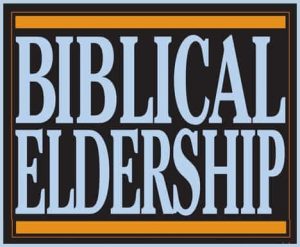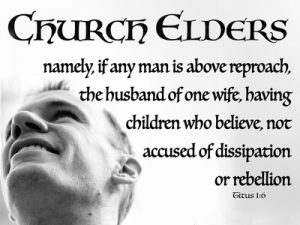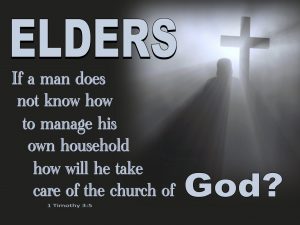
 This week we will conclude our study on the qualifications of eldership and move on to the office of deacon for next week’s study. Last week we noted that an elder or shepherd should not be a “lover of money” or one who chases after “sordid gain”, for a man who is a lover of money will end up with money as his master, not the Lord. We closed our study by looking at a number of qualifications found in Paul’s letter to Titus that were not specifically mentioned in his letter to Timothy but were addressed non-specifically…incorporated into the qualifications as a whole. They were “loving what is good”, “just”, “devout”, and “self-controlled”. An elder should have his affection on the things of God… those things that God finds good. He should behave justly and uprightly, approved by God in his conduct and thought. He is to be “devout”, holy in his behavior and conduct, free from besetting sin. And he is to be “self controlled”… able to control and restrain himself from ungodly desires and practices.
This week we will conclude our study on the qualifications of eldership and move on to the office of deacon for next week’s study. Last week we noted that an elder or shepherd should not be a “lover of money” or one who chases after “sordid gain”, for a man who is a lover of money will end up with money as his master, not the Lord. We closed our study by looking at a number of qualifications found in Paul’s letter to Titus that were not specifically mentioned in his letter to Timothy but were addressed non-specifically…incorporated into the qualifications as a whole. They were “loving what is good”, “just”, “devout”, and “self-controlled”. An elder should have his affection on the things of God… those things that God finds good. He should behave justly and uprightly, approved by God in his conduct and thought. He is to be “devout”, holy in his behavior and conduct, free from besetting sin. And he is to be “self controlled”… able to control and restrain himself from ungodly desires and practices.
These things come as no surprise as qualifications for eldership. They are marks of Christian maturity and edification. A man cannot shepherd the church of God if his affections are drawn toward selfish and sinful pursuits. If he is not characterized by godly and upright behavior, he cannot serve as an example to those following him or those considering following Christ. If he is not self controlled, he is not a man who can be trusted in his conduct or his teaching. Again, we note the high calling of those entrusted with the welfare of the church and the necessity of them having a high standard of character as well.
Returning to the text of 1 Tim 3:4ff we read, “He must be one who manages his own household well, keeping his children under control with all dignity 5 (for if a man does not know how to manage his own household, how will he take care of the church of God?), 6 and not a new convert, so that he will not become conceited and fall into the condemnation incurred by the devil. 7 And he must have a good reputation with those outside the church, so that he will not fall into reproach and the snare of the devil.” Our next qualification to look at, then, is “one who manages his own household well, keeping his children under control with all dignity” Paul’s letter to Titus says it this way, “having children who believe, not accused of dissipation or rebellion.”
 This is a surprisingly difficult passage to completely understand, and has been subject to quite a few different interpretations. Yet some aspects are relatively easy to understand. We know that all the qualifications for eldership stand under the general qualification of “above reproach”. We can also easily see that the “management” of the household is to be seen in the context of child rearing. It does not speak to the management of household finances or household cleanliness and order. Paul is not interested whether the lawn is mowed or the bathroom is spotless. That is not a qualification for eldership. Rather, he is speaking of the quality and character of the relationship between a man and his children. An elder is to be a man who effectively “manages” his children and the results of that “management” are children that are “under control with all dignity”. Again, in Titus we find it expressed in these words, “having children who believe, not accused of dissipation or rebellion.” But here is where we encounter some difficulty and disparity of interpretation.
This is a surprisingly difficult passage to completely understand, and has been subject to quite a few different interpretations. Yet some aspects are relatively easy to understand. We know that all the qualifications for eldership stand under the general qualification of “above reproach”. We can also easily see that the “management” of the household is to be seen in the context of child rearing. It does not speak to the management of household finances or household cleanliness and order. Paul is not interested whether the lawn is mowed or the bathroom is spotless. That is not a qualification for eldership. Rather, he is speaking of the quality and character of the relationship between a man and his children. An elder is to be a man who effectively “manages” his children and the results of that “management” are children that are “under control with all dignity”. Again, in Titus we find it expressed in these words, “having children who believe, not accused of dissipation or rebellion.” But here is where we encounter some difficulty and disparity of interpretation.
What age children are we talking about? What does “under control with all dignity mean? Are we talking about children who reside in the home or does it include adult children living outside of the home? How do we reconcile “having children who believe” with the clear biblical truth that every person stands on his own before God in regards to his faith… what he does with Christ? How can the father be held responsible for the faith of the child? Or is “believe” best translated as “obedient”, in reference to the father? Let’s take some time this evening and try to work through some of these questions.
In both 1Timothy and Titus, the word Paul uses for children is “teknon”. This word simply denotes offspring, with no reference to age or sex. Paul could have chosen to use the term “paidion”, which designates a young child, so it appears that Paul is not specifying only younger children. This is also clear from the context of Tit 1:6… the reference is to children not falling into drunkenness or rebellion. These are clearly characteristics of an older child. If we take “children who believe” as children who hold to Christian faith and practice (which is the plainest interpretation, and the one most consistent with how we find it interpreted in other passages of scripture), it would also lead us to believe that these are older children in mind in Paul’s letter to Titus… children above the “age of accountability”.
 Going back to Paul’s letter to Timothy, however, we do not see evidence that it is only older children that Paul has in mind. In fact, the argument could be made that here the description is more characteristic of younger children. “He must be one who manages his own household well, keeping his children under control with all dignity”. The word “manage” is literally “to preside over” or to “rule”. It contains the idea of leadership and oversight. In fact, it is the word used in 1 Tim 5:17 in reference to elders exercising authority in the church…”The elders who rule well are to be considered worthy of double honor, especially those who work hard at preaching and teaching.” So the thought here is that elders must properly exercise authority and influence over the lives of their children. The thought is carried further in the phrase “keeping his children under control with all dignity”. This speaks of children who are obedient and respectful. This certainly can and should be applied to younger children, and is similarly relevant to older children as well.
Going back to Paul’s letter to Timothy, however, we do not see evidence that it is only older children that Paul has in mind. In fact, the argument could be made that here the description is more characteristic of younger children. “He must be one who manages his own household well, keeping his children under control with all dignity”. The word “manage” is literally “to preside over” or to “rule”. It contains the idea of leadership and oversight. In fact, it is the word used in 1 Tim 5:17 in reference to elders exercising authority in the church…”The elders who rule well are to be considered worthy of double honor, especially those who work hard at preaching and teaching.” So the thought here is that elders must properly exercise authority and influence over the lives of their children. The thought is carried further in the phrase “keeping his children under control with all dignity”. This speaks of children who are obedient and respectful. This certainly can and should be applied to younger children, and is similarly relevant to older children as well.
Because of the use of the term “household”, which is literally “home”, I am persuaded that Paul is speaking of children who are still residing at home. An elder must be, in his role as the father and head of the home, one who provides a good example and a righteous standard which is followed by his children. He lives in manner worthy of respect and emulation. Listen to how Paul explains the need for this qualification in the next verse, “but if a man does not know how to manage his own household, how will he take care of the church of God?” In other words, if a shepherd is unable to effectively influence his children to faith and godly behavior, how can he be entrusted with the church of God? While it is unarguably a legitimate question to pose, some might ask whether it is a fair question. Should a man be held responsible for the behavior and faith of his children? And the biblical answer is, “Yes, at least in part”.
There are many passages of scripture that deal with the responsibility of a parent in regards to raising up a child. Eph 6:4 says, “Fathers, do not provoke your children to anger, but bring them up in the discipline and instruction of the Lord.” This verse shows that a parent can have a positive or negative effect on the development of their child. Proverbs 13:24 indicates much the same thing, “Whoever spares the rod hates his son, but he who loves him is diligent to discipline him.” And then there is Prov 22:6, “Train up a child in the way he should go, Even when he is old he will not depart from it.” And Col 3:21, “Fathers, do not provoke your children, lest they become discouraged.”… I could go on. So, is a parent ultimately responsible for their child’s life choices? Of course not. But does a parent bear some responsibility for those choices? Absolutely.
 In the same way, an elder or prospective elder can be legitimately judged on the basis of how his children behave and believe under his care. Fundamentally, though, it is not the character of his children that is being judged but the quality of his parental care. And it is not an exact science. Some children will turn out well in spite of the quality of the parental care they receive. And some might turn out poorly even under the best of care. Perhaps we would be wise to stop and reflect upon the overarching truth of these passages… that an elder is to be “above reproach”. We know that a man can have godly children and still be subject to reproach on the basis of his poor parenting… it is just not the norm. Is it equally true that a man might have wayward and unruly children yet be above reproach in his parenting? That is less clear…but it, too, would not be the norm but rather a rarity.
In the same way, an elder or prospective elder can be legitimately judged on the basis of how his children behave and believe under his care. Fundamentally, though, it is not the character of his children that is being judged but the quality of his parental care. And it is not an exact science. Some children will turn out well in spite of the quality of the parental care they receive. And some might turn out poorly even under the best of care. Perhaps we would be wise to stop and reflect upon the overarching truth of these passages… that an elder is to be “above reproach”. We know that a man can have godly children and still be subject to reproach on the basis of his poor parenting… it is just not the norm. Is it equally true that a man might have wayward and unruly children yet be above reproach in his parenting? That is less clear…but it, too, would not be the norm but rather a rarity.
It would be unwise to appoint to the office of overseer a man with wayward or unruly children in the home… if for no other reason than to allow him to focus on the more needful tasks of raising his children and establishing a godly home. But what about wayward or unbelieving adult children that are no longer under the authority of their father…no longer in his home? While I believe these passages would not preclude that man from serving as an elder, I also believe these passages would warn us to be very careful in evaluating that man’s character and conduct in how he handles relationships before he might be appointed to shepherd God’s church. He might still be subject to reproach for his part in the wayward conduct and faithlessness of his children.
At this point, let’s move on to the last two qualifications for eldership, that he be “not a new convert, so that he will not become conceited and fall into the condemnation incurred by the devil. 7 And he must have a good reputation with those outside the church, so that he will not fall into reproach and the snare of the devil.” The first is that he not be a new convert. We might be swayed by the passion, excitement, and zeal of a man recently having found new life in Christ. It is not unusual for these men to be outspoken in their proclamation of the gospel and hungry for God’s Word and presence. They often have a great desire to serve God and be used by Him in the church. But we are warned against appointing that man to a position as overseer of the church. An immediate problem that presents itself is that such a man has yet to be adequately tested…there has been likely insufficient time to gauge his character and faith. But more pointedly, Paul warns that by “elevating” him too quickly, he can fall into the sin of pride. It is the sin which consumed the heart of Satan… wanting to declare himself equal with God. And the result is that he was cast down instead. The elder that falls victim to pride… thinking more highly of himself than he ought… is not fit to be an elder and must be removed from leadership. He, like Satan, ends up being cast down from his position of authority and responsibility. Humility stands as a necessary prerequisite for leadership.
 The second remaining qualification is that he must have a good reputation outside the church. It is better rendered “a good testimony” or “good witness”. He is not to be a man that lives one way among the saints and another way in the world. To put it a different way, he is not to be a man justly accused of hypocrisy. It is interesting… the world is not content to judge us by their standards… they rightly insist on judging us by our own. The men appointed to lead God’s church must have a consistent witness before their fellow saints and before the world around them. Failure in this regard leads to reproach, or better translated “disgrace”. How can an elder impact his community for Christ if he is living a life little different than their own? The answer, of course, is that he cannot. He has effectively rendered himself useless in that regard, having fallen into “the snare of the devil”.
The second remaining qualification is that he must have a good reputation outside the church. It is better rendered “a good testimony” or “good witness”. He is not to be a man that lives one way among the saints and another way in the world. To put it a different way, he is not to be a man justly accused of hypocrisy. It is interesting… the world is not content to judge us by their standards… they rightly insist on judging us by our own. The men appointed to lead God’s church must have a consistent witness before their fellow saints and before the world around them. Failure in this regard leads to reproach, or better translated “disgrace”. How can an elder impact his community for Christ if he is living a life little different than their own? The answer, of course, is that he cannot. He has effectively rendered himself useless in that regard, having fallen into “the snare of the devil”.
Beloved, Satan takes a warped sense of glee and satisfaction when he is able to render us ineffective or in disgrace. He wants to lead us into worldly pride and worldly lusts. It is perhaps best stated in 1 John 2:16, “For all that is in the world, the lust of the flesh and the lust of the eyes and the boastful pride of life, is not from the Father, but is from the world.” And I would submit that he wishes to bring down those in Christian leadership most of all. Those entrusted with leadership must be diligent and watchful… first and foremost over their own conduct and character, and then over those for whom they have the responsibility of care. And it is not only those in leadership…we all need to examine ourselves and be watchful over our brothers and sisters. For we all have a responsibility to care for those around us.
I would like to leave you with these final thoughts this evening. We have spent many weeks looking at the necessary qualifications for those whom God calls to lead, and we have seen that it is a high standard to attain. But it is imperative that we have men with this character, love, and maturity in leadership. For when we do, we can joyfully heed the words of Hebrews 13:17 and those found in I Thes 5:12ff.
“Obey your leaders and submit to them, for they keep watch over your souls as those who will give an account. Let them do this with joy and not with grief, for this would be unprofitable for you.”
And…
“we request of you, brethren, that you appreciate those who diligently labor among you, and have charge over you in the Lord and give you instruction, 13 and that you esteem them very highly in love because of their work”
We are blessed by our shepherds when they diligently watch over and care for us. We bless them when we joyfully and thankfully submit to their loving oversight, and love and respect them deeply in return.
Let us pray…

0 Comments